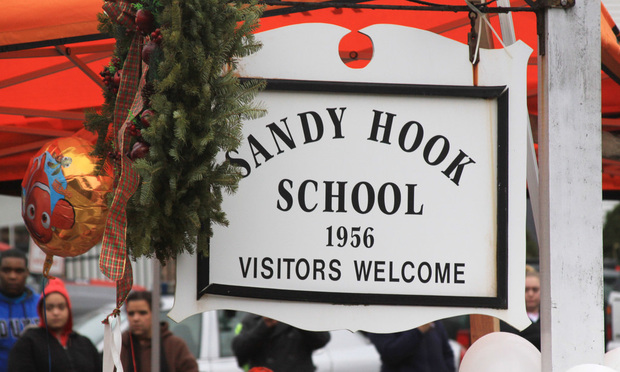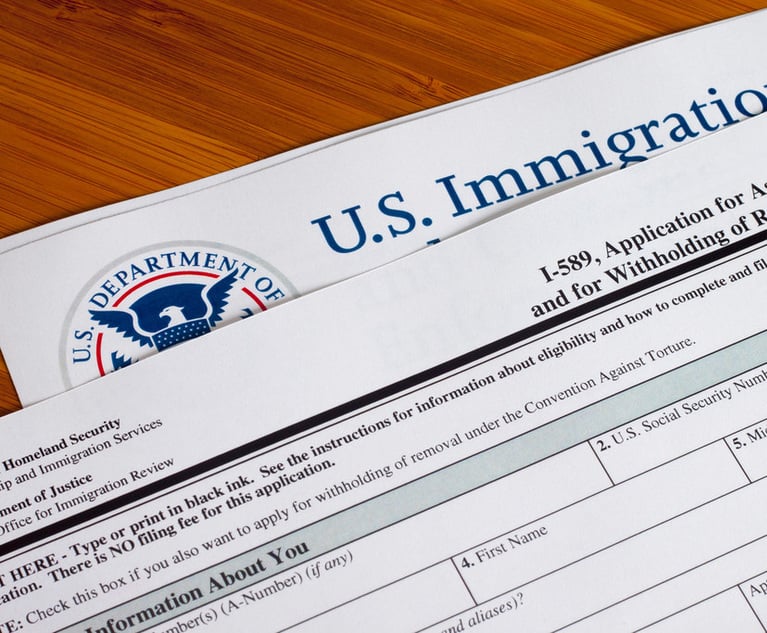Appellate Court Rules Against Sandy Hook Plaintiffs in School Safety Lawsuit
The Connecticut Appellate Court upheld a lower court ruling siding with the town of Newtown in a case alleging inadequate school-safety procedures during the December 2012 mass shooting at Sandy Hook Elementary School.
July 15, 2019 at 01:18 PM
4 minute read
 Sandy Hook Elementary School. Photo: Ron Frank/Shutterstock.com
Sandy Hook Elementary School. Photo: Ron Frank/Shutterstock.com
Citing government immunity, the Connecticut Appellate Court ruled against two families who alleged negligence and inadequate school-safety protocols contributed to the death of their loved ones during the Sandy Hook Elementary School shooting in December 2012.
The appellate court upheld a lower court's ruling granting summary judgment to the town of Newtown and its education board on the ground of governmental immunity, finding the plaintiffs made no specific allegations against any faculty or staff at the time of the shooting, and that school security guidelines imposed discretionary responsibilities, not a ministerial duty, on the defendants.
The school was initially named as a defendant, but plaintiffs later withdrew claims against it.
Plaintiffs were the families of Jesse Lewis and Noah Pozner, two elementary school students killed in the shooting. They argued top school officials knew there was a protocol to lock down the school and shut the doors to every classroom. But they said officials initiated no lockdown during the incident in which Adam Lanza killed 20 schoolchildren and six educators.
At trial, Danbury Superior Court Judge Robin Wilson focused her May 2018 decision primarily on government immunity. On appeal, the appellate court agreed with Wilson, and affirmed her ruling.
“The plaintiffs also claim that the trial court erred in rendering summary judgment because the school security guidelines adopted by the defendants imposed upon the school faculty and staff a ministerial duty to act in a prescribed manner during the shooting,” Judge Thomas Bishop wrote for the appellate panel. “The language in the guidelines referenced by the plaintiffs contradicts this claim.”
Bishop added: “We agree with the trial court and conclude that no reasonable juror could have found that the school security guidelines imposed a ministerial duty upon the faculty and staff.”
In their April 17 appellate oral argument, plaintiffs claimed the defendants left the school's faculty and staff in a position in which they failed or could not adhere to mandatory school security guidelines. The defendants' rebuttal, however, was a successful motion for summary judgment stating they were entitled to government immunity pursuant to the Connecticut General Statutes, and that there was no genuine issue of material fact regarding the alleged negligence.
In the 19-page ruling, Bishop wrote, “The school security guidelines contained qualifying language such as 'may' or 'should,' which indicated that the school faculty and staff had discretion to exercise judgment in following them.”
Representing the families are Donald Papcsy and Devin Janosov, both with Papcsy Janosov Roche Trial Lawyers in Norwalk.
In an emailed statement late Monday to the Connecticut Law Tribune, Papcsy said: “We are encouraged that the Connecticut Appellate Court found that the trial court erred significantly in a major portion of its summary judgment ruling, and are looking forward to moving on to our esteemed Supreme Court so that they may have the opportunity to further hash these errors out, and remand this case back to the trial court to provide the chance these heroic families deserve to be heard, and keep future kids safer in the process.”
Representing the defense are Charles Deluca and John Cannavino Jr. of Ryan Ryan Deluca, and Thomas Lambert and Monte Frank with Pullman & Comley.
In an emailed statement to the Connecticut Law Tribune, Deluca wrote: “We are obviously pleased with the decision. Similar to the trial court decision, the Appellate Court's decision was thoughtful and well-reasoned. It was particularly gratifying that the Appellate Court noted that no reasonable juror could find negligence in the instinctive and heroically protective actions of the school staff that day.”
Newtown's town attorney, Cohen & Wolf's David Grogins, did not respond to a request for comment.
Read More:
Appellate Court Set to Hear Arguments in School Protocol Lawsuit After Sandy Hook Shooting
This content has been archived. It is available through our partners, LexisNexis® and Bloomberg Law.
To view this content, please continue to their sites.
Not a Lexis Subscriber?
Subscribe Now
Not a Bloomberg Law Subscriber?
Subscribe Now
NOT FOR REPRINT
© 2025 ALM Global, LLC, All Rights Reserved. Request academic re-use from www.copyright.com. All other uses, submit a request to [email protected]. For more information visit Asset & Logo Licensing.
You Might Like
View All
Trump Administration Faces Legal Challenge Over EO Impacting Federal Workers
3 minute read
Settlement Allows Spouses of U.S. Citizens to Reopen Removal Proceedings
4 minute read
Trending Stories
- 1We the People?
- 2New York-Based Skadden Team Joins White & Case Group in Mexico City for Citigroup Demerger
- 3No Two Wildfires Alike: Lawyers Take Different Legal Strategies in California
- 4Poop-Themed Dog Toy OK as Parody, but Still Tarnished Jack Daniel’s Brand, Court Says
- 5Meet the New President of NY's Association of Trial Court Jurists
Who Got The Work
J. Brugh Lower of Gibbons has entered an appearance for industrial equipment supplier Devco Corporation in a pending trademark infringement lawsuit. The suit, accusing the defendant of selling knock-off Graco products, was filed Dec. 18 in New Jersey District Court by Rivkin Radler on behalf of Graco Inc. and Graco Minnesota. The case, assigned to U.S. District Judge Zahid N. Quraishi, is 3:24-cv-11294, Graco Inc. et al v. Devco Corporation.
Who Got The Work
Rebecca Maller-Stein and Kent A. Yalowitz of Arnold & Porter Kaye Scholer have entered their appearances for Hanaco Venture Capital and its executives, Lior Prosor and David Frankel, in a pending securities lawsuit. The action, filed on Dec. 24 in New York Southern District Court by Zell, Aron & Co. on behalf of Goldeneye Advisors, accuses the defendants of negligently and fraudulently managing the plaintiff's $1 million investment. The case, assigned to U.S. District Judge Vernon S. Broderick, is 1:24-cv-09918, Goldeneye Advisors, LLC v. Hanaco Venture Capital, Ltd. et al.
Who Got The Work
Attorneys from A&O Shearman has stepped in as defense counsel for Toronto-Dominion Bank and other defendants in a pending securities class action. The suit, filed Dec. 11 in New York Southern District Court by Bleichmar Fonti & Auld, accuses the defendants of concealing the bank's 'pervasive' deficiencies in regards to its compliance with the Bank Secrecy Act and the quality of its anti-money laundering controls. The case, assigned to U.S. District Judge Arun Subramanian, is 1:24-cv-09445, Gonzalez v. The Toronto-Dominion Bank et al.
Who Got The Work
Crown Castle International, a Pennsylvania company providing shared communications infrastructure, has turned to Luke D. Wolf of Gordon Rees Scully Mansukhani to fend off a pending breach-of-contract lawsuit. The court action, filed Nov. 25 in Michigan Eastern District Court by Hooper Hathaway PC on behalf of The Town Residences LLC, accuses Crown Castle of failing to transfer approximately $30,000 in utility payments from T-Mobile in breach of a roof-top lease and assignment agreement. The case, assigned to U.S. District Judge Susan K. Declercq, is 2:24-cv-13131, The Town Residences LLC v. T-Mobile US, Inc. et al.
Who Got The Work
Wilfred P. Coronato and Daniel M. Schwartz of McCarter & English have stepped in as defense counsel to Electrolux Home Products Inc. in a pending product liability lawsuit. The court action, filed Nov. 26 in New York Eastern District Court by Poulos Lopiccolo PC and Nagel Rice LLP on behalf of David Stern, alleges that the defendant's refrigerators’ drawers and shelving repeatedly break and fall apart within months after purchase. The case, assigned to U.S. District Judge Joan M. Azrack, is 2:24-cv-08204, Stern v. Electrolux Home Products, Inc.
Featured Firms
Law Offices of Gary Martin Hays & Associates, P.C.
(470) 294-1674
Law Offices of Mark E. Salomone
(857) 444-6468
Smith & Hassler
(713) 739-1250











